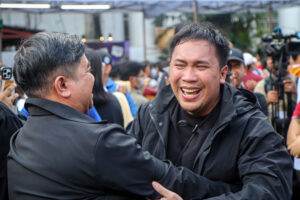Written by Isabel Daenah Y. Manzanero | August 10, 2025
Philippines Set Sights on Gold in SEA Games 2025
UNITING Southeast Asian countries in a momentous event of sportsmanship, the 33rd Southeast Asian (SEA) Games is hosted this year by Thailand. With the games scheduled to take place from Dec. 9 to 20, the Philippines is preparing its largest-ever delegation of almost 1,600 athletes.
Origins of the SEA Games
The SEA Games is a multi-sport international event, authorized by the Southeast Asian Games Federation (SEAGF) and held every two years. It began in 1959 with 527 competing athletes from Thailand, Burma, Malaysia, Singapore, South Vietnam, and Laos competing in 12 different sports.
Before the Philippines, Brunei, and Indonesia joined in 1977, it was originally called the Southeast Asian Peninsular Games. The Philippine national basketball team secured a gold medal that same year.
This marks the seventh time Thailand has hosted the SEA Games. The games will be held in Bangkok and its metropolitan area, Chonburi Province, and Songkhla Province. The three cities were selected through a formal bidding and voting process, which was the first time the selection was done through this method.
Setting Sight on Victory
After 42 years of participating in the SEA Games, the Philippines has accumulated 921 gold medals, 1056 silver medals, and 1418 bronze medals. For this year, Abraham Tolentino, Philippine Olympic Committee president, considers this the biggest delegation with athletes joining more team events beyond basketball, football, and volleyball, such as ice hockey and ice skating.
With the competitive streak of the Philippines comes additional expenses. Patrick Gregorio, Philippine Sports Commission chair, promised to provide unwavering support to the national team.
“We just finished our board meeting and saw a lot of requests concerning the SEA Games, and we are prioritizing those, whether it's training or international exposure,” he said.
Preparing to Make History
During the 32nd SEA Games, the Philippines finished in fifth place in the medal tally with 58 golds, 85 silvers, and 117 bronzes. With these numbers, the athletes are more determined to get better results and improve their standings.
According to John Gutierrez, president of the Philippine Football Federation (PFF), who is filing entries for women's football, women's futsal, and men's football, the national teams are aiming for the gold medal. Included in the team is 18-year-old rising star, Otu Abang Banatao, already leading the scoring charts.
“So it’s looking very good for us for the SEA Games. We want to win all the entries,” he claims.
The Philippine Handball men's and women’s national teams are also hopeful to secure a first-ever SEA Games medal after the success in the Southeast Asian Beach Handball Championships, with the men’s team bagging a gold medal while the women’s team brought home the bronze medal.
“It's a good experience for us, a good fuel to boost our preparations for the SEA Games,” Rafael Andrew Agtarap, Men’s team member, said during the Philippine Sportswriters Association Forum last Feb. 18.
Along with traditional sports, e-sports also remains a strong competitor representing the country. The Philippines has been the defending champions since the introduction of Mobile Legends: Bang Bang (MLBB) in the 2019 SEA Games, Team Liquid Philippines (TLPH) plans to bring home another gold medal. The TLPH is composed of Marin Vinuya (Sanford), Karl Gabriel Nepomuceno (KarlTzy), Alston Pabico (Sanji), Jaypee Gonzales Dela Cruz (Jaypee), and Kiel Galvin Soriano (OHEB).
With the highest delegation of athletes in Philippine history, united by the goal of bringing home pride and victory, Filipino athletes are ready to showcase their skills on the Southeast Asian stage.
Volume 31 | Issue 2




